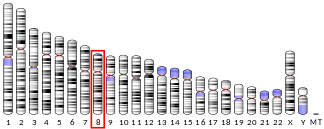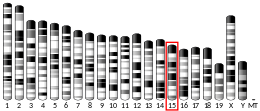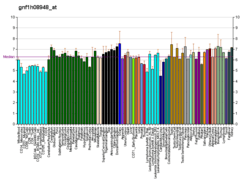ABRA (gene)
Actin-binding Rho-activating protein is a protein that in humans is encoded by the ABRA gene.[5] The mouse and rat homologues are known as STARS (striated muscle activator of Rho signalling) and MS1 (myocyte stress 1) respectively.[6]
MS1/STARS is regulated by MyoD during myogenic differentiation of the C2C12 cell line.
References
- 1 2 3 GRCh38: Ensembl release 89: ENSG00000174429 - Ensembl, May 2017
- 1 2 3 GRCm38: Ensembl release 89: ENSMUSG00000042895 - Ensembl, May 2017
- ↑ "Human PubMed Reference:".
- ↑ "Mouse PubMed Reference:".
- ↑ Arai A, Spencer JA, Olson EN (Jul 2002). "STARS, a striated muscle activator of Rho signaling and serum response factor-dependent transcription". J Biol Chem. 277 (27): 24453–9. doi:10.1074/jbc.M202216200. PMID 11983702.
- ↑ "Entrez Gene: ABRA actin-binding Rho activating protein".
External links
- Human ABRA genome location and ABRA gene details page in the UCSC Genome Browser.
Further reading
- Hartley JL, Temple GF, Brasch MA (2001). "DNA cloning using in vitro site-specific recombination". Genome Res. 10 (11): 1788–95. doi:10.1101/gr.143000. PMC 310948. PMID 11076863.
- Wiemann S, Weil B, Wellenreuther R, et al. (2001). "Toward a catalog of human genes and proteins: sequencing and analysis of 500 novel complete protein coding human cDNAs". Genome Res. 11 (3): 422–35. doi:10.1101/gr.GR1547R. PMC 311072. PMID 11230166.
- Simpson JC, Wellenreuther R, Poustka A, et al. (2001). "Systematic subcellular localization of novel proteins identified by large-scale cDNA sequencing". EMBO Rep. 1 (3): 287–92. doi:10.1093/embo-reports/kvd058. PMC 1083732. PMID 11256614.
- Strausberg RL, Feingold EA, Grouse LH, et al. (2003). "Generation and initial analysis of more than 15,000 full-length human and mouse cDNA sequences". Proc. Natl. Acad. Sci. U.S.A. 99 (26): 16899–903. doi:10.1073/pnas.242603899. PMC 139241. PMID 12477932.
- Ota T, Suzuki Y, Nishikawa T, et al. (2004). "Complete sequencing and characterization of 21,243 full-length human cDNAs". Nat. Genet. 36 (1): 40–5. doi:10.1038/ng1285. PMID 14702039.
- Gerhard DS, Wagner L, Feingold EA, et al. (2004). "The status, quality, and expansion of the NIH full-length cDNA project: the Mammalian Gene Collection (MGC)". Genome Res. 14 (10B): 2121–7. doi:10.1101/gr.2596504. PMC 528928. PMID 15489334.
- Wiemann S, Arlt D, Huber W, et al. (2004). "From ORFeome to biology: a functional genomics pipeline". Genome Res. 14 (10B): 2136–44. doi:10.1101/gr.2576704. PMC 528930. PMID 15489336.
- Kuwahara K, Barrientos T, Pipes GC, et al. (2005). "Muscle-specific signaling mechanism that links actin dynamics to serum response factor". Mol. Cell. Biol. 25 (8): 3173–81. doi:10.1128/MCB.25.8.3173-3181.2005. PMC 1069631. PMID 15798203.
- Mehrle A, Rosenfelder H, Schupp I, et al. (2006). "The LIFEdb database in 2006". Nucleic Acids Res. 34 (Database issue): D415–8. doi:10.1093/nar/gkj139. PMC 1347501. PMID 16381901.
- Kuwahara K, Teg Pipes GC, McAnally J, et al. (2007). "Modulation of adverse cardiac remodeling by STARS, a mediator of MEF2 signaling and SRF activity". J. Clin. Invest. 117 (5): 1324–34. doi:10.1172/JCI31240. PMC 1838928. PMID 17415416.
This article is issued from
Wikipedia.
The text is licensed under Creative Commons - Attribution - Sharealike.
Additional terms may apply for the media files.




